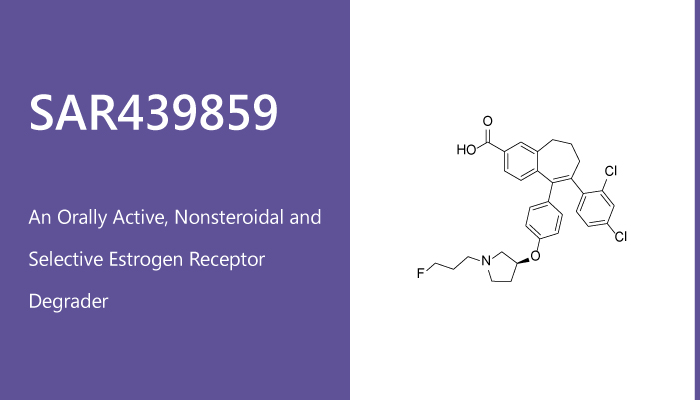It is estimated that worldwide 6270001 women died in 2018 due to breast cancer. Breast cancer is the most common cancer in females. In addition, Breast cancer (BCs) can be classified into three groups. BC includes Estrogen Receptor positive (ER+) and/or Progesterone Receptor positive (PR+) (represent about 75% of all BCs), Her2/neu positive (represent about 15% of all BCs), representing 15% of all BCs and triple-negative (represent about 10% of all BCs). For ER+ groups, there are three standards of care treatments for ER-positive BC. Especially, I’d like to introduce a small molecule SAR439859 that has the potential to treat ER+ cancers.

In general, SAR439859 is an orally active and selective estrogen receptor degrader (SERD). This molecule is a potent ER antagonist, with an EC50 of 0.2 nM for ERα degradation. SAR439859 demonstrates robust antitumor efficacy and limited cross-resistance in ER+ breast cancer.
In vitro, SAR439859 induces strong in vivo antitumor activity against a variety of BC cell lines and patient-derived xenografts, including models that harbor ERα mutations.
Moreover, in vivo SAR439859 exhibits substantial tumor-growth inhibition and displays tumor regression at the dose of 25 mg/kg/BID.
Additionally, SAR439859 (3 mg/kg for iv and 10 mg/kg for PO) shows a low to moderate clearance in the three animal species tested (0.03-1.92 L/h•kg), low to moderate volume of distribution (Vss=0.5-6.1 L/kg), and good bioavailability (54-76%) across species. It is noticed that T1/2 was variable across species (1.98 h in mouse, 4.13 h in rat and 9.80 h in dog).
Reference:
El-Ahmad Y, et al. J Med Chem. 2020 Jan 23;63(2):512-528.